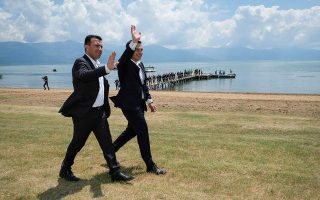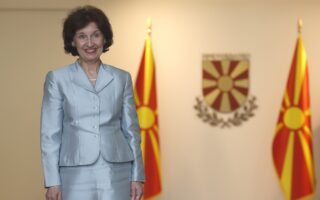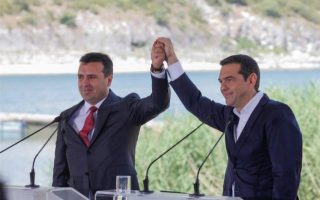Will North Macedonia become Orban’s Balkan gateway?

All diplomatic eyes in Athens will be on North Macedonia this weekend, as Parliament votes on approving the government announced by the leader of the nationalist VMRO-DPMNE party and winner of last month’s parliamentary elections, Hristijan Mickoski.
Interest on the Greek side is focused on whether Mickoski and his ministers will swear to serve their country under its constitutional and internationally recognized name, North Macedonia, or whether they will swear to a country that for the rest of the planet and by law is nonexistent.
Greece may be interested only in the erga omnes obligations, but those who look at the bigger picture see something much more dangerous in the new premier’s statements
Shortly before unveiling his cabinet, Mickoski made a point of stating that he would be using the constitutional name, Republic of North Macedonia, in the swearing-in ceremony and during any contacts he has abroad with foreign leaders. Inside the country, though, both in public appearances and in statements, he said he would use the name “Macedonia.” This means, for example, that if he were to meet his friend and fellow nationalist-populist Viktor Orban in Budapest, he would do so as the prime minister of North Macedonia; if, however, Orban were to return the visit and go to Skopje, Mickoski would appear as the prime minister of “just Macedonia.”
We could dismiss all this as Balkan shenanigans were it not for the fact that we are talking about an unstable state that affects the balance of power in Southeastern Europe.
Greece may be interested only in the erga omnes obligations, but those who look at the bigger picture see something much more dangerous in the new prime minister’s statements. Right from the get-go, before even taking his oath of office, Mickoski challenged not just the Prespa Agreement with Greece, but also the Ohrid Framework Agreement with Albania and the Friendship Pact with Bulgaria, which determine North Macedonia’s very existence.
“We will not be made to stray off our path by unprincipled agreements that harm our state,” Mickoski stated. If he decides to “follow his heart,” Mickoski risks jeopardizing North Macedonia’s European prospects and its presence in NATO; it is not at all clear, however, whether he has the permission of the citizens of North Macedonia to do such a thing.
Is he actually aiming to challenge his country’s geopolitical orientation, as per the paradigm of Orban, his mentor and, according to many, secret benefactor of the VMRO-DPMNE?
In other words, is Mickoski setting himself up to be a vehicle for the spread of Orbanism into the Balkans, a scheme that the Hungarian nationalist-populist and pro-Russian leader has attempted before with North Macedonia’s fugitive ex-premier Nikola Gruevski, now his “guest” in Budapest? There are many Western diplomats in Skopje who see Mickoski in precisely this role.





